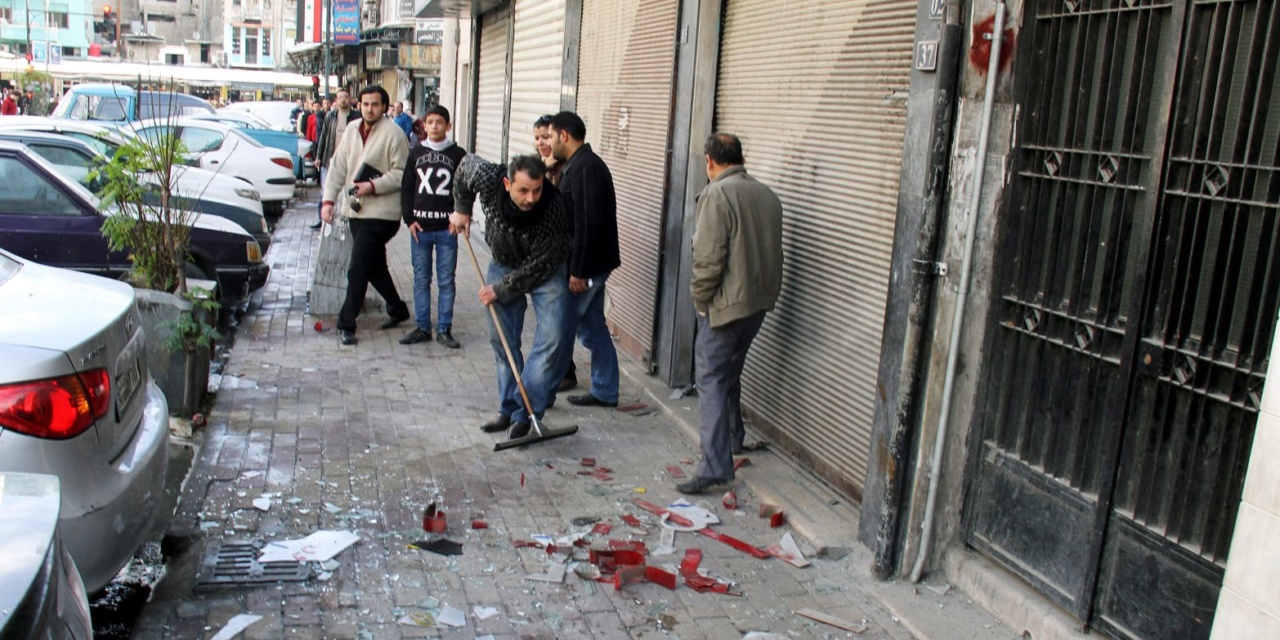A man clears the street of rubbish in front of his Damascus shop
Defying Assad regime propaganda and the watch of the security services, residents of Syria’s capital Damascus have spoken of life with shortages and fear.
Syria Direct spoke to Damascenes after eight years of conflict, such as Raeda, who lives at the foot of Mount Qasioun.
“Damascus is no longer Damascus,” she says, with electricity cuts of up to 12 hours a day and homes without refrigerators, televisions and washing machines. “People have returned to the old days.”
She speaks of women and children sleeping on the sidewalks, old men searching for food in rubbish bins, and queues for essentials from cooking gas to milk.
Amid displacement from the conflict and forced conscription into the regime army, Raeda says she rarely meets those she knows: “Sometimes, I feel like a stranger to Damascus. Wherever you go, you feel pain and sorrow at the thought of how things used to be.”
Having reoccupied parts of Damascus and surrounding areas after conventional and chemical attacks, the Assad regime has proclaimed peace and reconstruction, holding high-profile events such as the Damascus International Fair.
But Damascenes face rising prices and devastated infrastructure. Some are now breaking the “kingdom of silence” under the regime and its intelligence services. On social media, there are complaints and black humor about hardship and corruption.
Shireen, a charity worker, says friends caution her, “Your tongue is long. Tuck it away! Aren’t you afraid?”
But she persists even though friends and relatives have maintained silence and even broken contact.
“I’m not doing anything [wrong]. I’m criticizing within the red lines permitted to me,” she says, checking herself at criticism of prominent government members and ministries.
Social Change, Political Limits
Nidal, a television director for a pro-regime outlet, says conflict has spurred the breaking of social taboos with discussion of same-sex relationships and students living with flatmates of the opposite sex.
“As long as we focus on the issue from a social perspective we’re safe,” he explains.
But with politics, there are “red lines that cannot be crossed”: “You can talk about the electricity [cuts]. But don’t bring up the ministry.”
Shireen shrugs. “It’s like a justification,” she says, and imitates a regime official: “‘Yes, Mr. Citizen! You can express your opinion on these things. We feel your pain!’”
Poking fun at shortages, a Damascus man “marries” a gas canister
Anger and Black Humor: How Residents in Regime-Held Syria Are Coping With Shortages
Recently Bashar al-Assad acknowledged in a speech that there was suffering, as he chided corruption, selfishness, and fraud. But he quickly labelled criticism as a “social media war” with the regime.
Speaker of Parliament Hamouda al-Sabbagh said that“the Government would explain the objective reasons” but then focused on “electronic campaigns intensified on us through Facebook and social media, which are managed mostly from abroad,…to carry confusion in the ranks of public opinion”.
Syria Daily, March 29: Civilians Struggle With Shortages in Regime Areas
Muhammad al-Shami of Lens Young Dimashqi, an opposition media outlet featuring photography of everyday life in Damascus, explains: “This criticism is not about holding anyone responsible and does not reflect a desire for reform. It’s a theater performance.”
He said he will only ever post criticism anonymously, so he “won’t disappear”.
Pro-regime journalists have been among those disappearances. Wissam al-Tayr, head of the Damascus Now network, was arrested in December and his whereabouts are unknown.
Shireen says no one is immune from the police and state security: “If you get into a fight with them — even if it’s just about a pack of cigarettes, they can drag you to the [security] branches and invent a suitable accusation for you.”
She again falls back on dark humor: “Everyone in this country has created their own state around them,”


Damascus was my city, and will still as I knew ‘her’ in my heart. That young, old city with the beautiful soul, the city that never sleeps, the birth and rebirth of pleasure and amusement. The darkness will end someday, and Damascus will regenerate and born again.
Monis,
Thank you for this.
S.